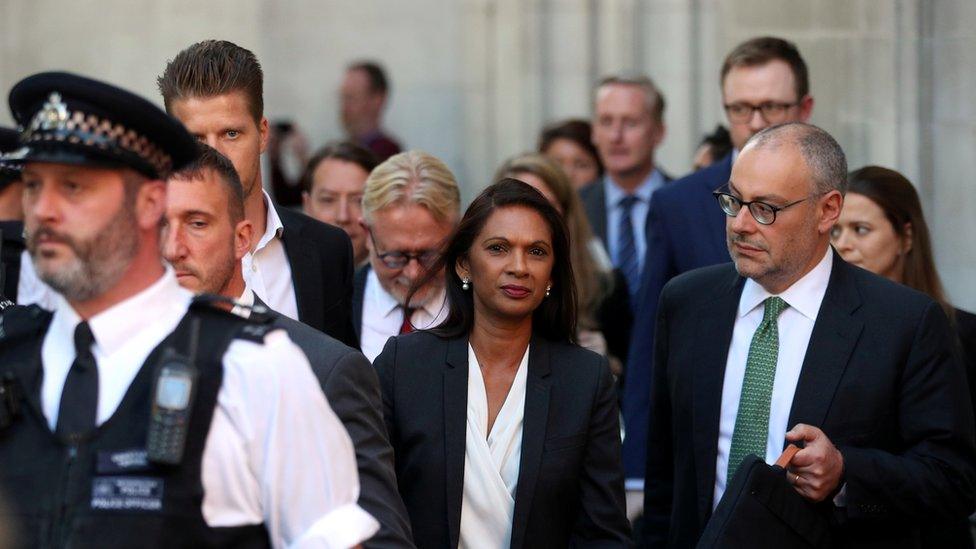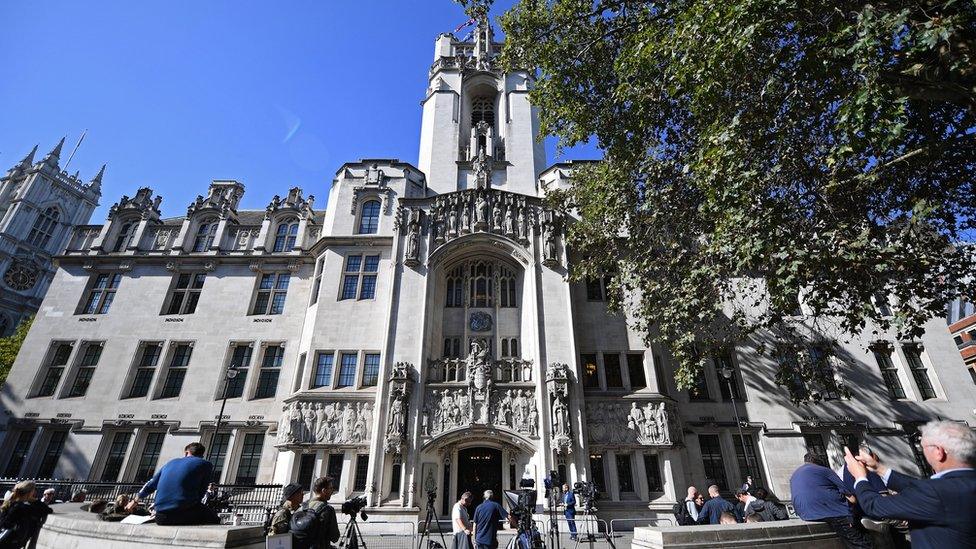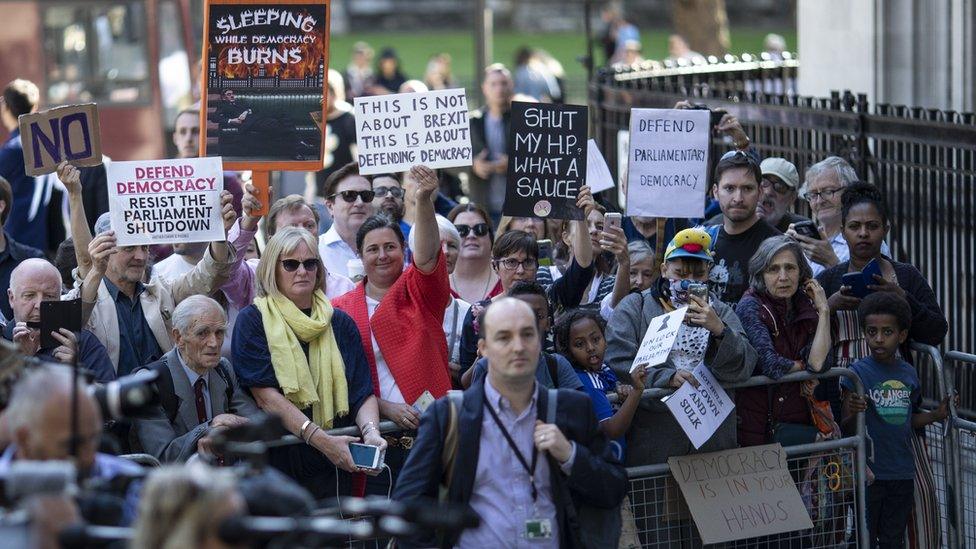Supreme Court to rule on Parliament suspension on Tuesday
- Published
Mr Johnson refuses to rule out suspending Parliament again
A ruling on the legality of Boris Johnson's decision to suspend Parliament will be announced by the Supreme Court on Tuesday at 10:30 BST.
Ministers say the five-week suspension - or prorogation - is not a court matter, but critics argue the PM wants to limit scrutiny of his Brexit policy.
Parliament is currently due to return on 14 October, with the UK scheduled to leave the EU on 31 October.
The government has said it will "abide by the ruling".
But Mr Johnson has refused to rule out seeking to prorogue Parliament for a second time if the Supreme Court judgement goes against him.
Asked by the BBC's deputy political editor John Pienaar if he would do that, Mr Johnson replied: "I think it's very important that we look at what the judgement says when it comes out."
Asked whether he would resign if the court ruling went against him, he said: "Let us see what the justices say. I'm going to wait and see what the judgement is.
"And I want to stress that this is a government that fully respects the law and fully respects the judiciary."
The PM added that it was "sensible" for MPs to have their say on Brexit - but there was "ample time at the end of October for them to do just that".
During prorogation, the business of Parliament stops. This means any laws that have not been passed will fall.
It also means MPs are unable to put questions to ministers or scrutinise government legislation.
MPs have no say over when and if Parliament is prorogued - it is done by the Queen, who acts on a request from the prime minister.

Campaigner Gina Miller is seeking a second Supreme Court victory over the government
The three-day hearing at the highest court in the country dealt with two appeals - one from campaigner and businesswoman Gina Miller, the second from the government
Mrs Miller was appealing the English High Court's decision to throw out her challenge to prorogation.
The government, on the other hand, was appealing the ruling from Scotland's Court of Session that the prorogation was "unlawful" and had been used to "stymie" Parliament.
The challenge to the prorogation in the Scottish Court was brought by 75 parliamentarians, including SNP MP Joanna Cherry.
The BBC's Clive Coleman takes a look inside the UK's Supreme Court
During the court case, government lawyer Lord Keen QC said prorogation was "forbidden territory, which is a matter between the executive and Parliament", and MPs "had the tools" to change the law if they did not like it.
However, Lord Pannick QC, representing Mrs Miller, argued it "was motivated, or at least strongly influenced" by Mr Johnson's belief that Parliament was "a threat to the implementation of his policies".
Mr Johnson said he was proroguing Parliament at this time in order to hold a new Queen's Speech on 14 October to outline the government's legislative plans for the year ahead.
However, the timing has been controversial, as it reduces the period Parliament is sitting in the run up to the Brexit deadline.
Some MPs held protests in the chamber when the prorogation began earlier this month, with some MPs holding signs saying "silenced" while shouting: "Shame on you."
What happened at the Supreme Court and what could happen next?
Mr Johnson, who is in New York for a UN climate conference, said he hoped to "make progress" with a Brexit deal in meetings with other EU leaders later on Monday.
But he stressed the UK would leave regardless on 31 October, adding: "I will not extend and I don't think, by the way, there is much appetite around the table for an extension either - people want to get this thing done."
What could happen next?
If the government wins at the Supreme Court, then nothing changes - Parliament remains suspended until 14 October.
But things could get complicated if the justices decide Mr Johnson acted unlawfully.
In documents submitted to the court, the government said it could see three options if the court ruled against it - and in some scenarios, it might just suspend Parliament all over again.
The court might rule this suspension unlawful, but their reasons might leave open the possibility of proroguing Parliament for the same time period in a different, lawful way
The judges could decide that the only lawful option is for the prime minister to recall Parliament before 14 October. Lawyers for Mr Johnson said he would comply, but it would require "extensive arrangements" to draw up a new Queen's Speech and get ready for the ceremonial State Opening of Parliament
The judges could declare the suspension unlawful, and therefore Parliament remains in session as if it had never stopped. The government said it might still be able to consider suspending it again
But Lord Pannick said all the judges needed to do was declare the suspension unlawful. The prime minister would not have to take any action and the Speakers of the Commons and Lords could decide how to proceed.
- Published22 September 2019

- Published19 September 2019
